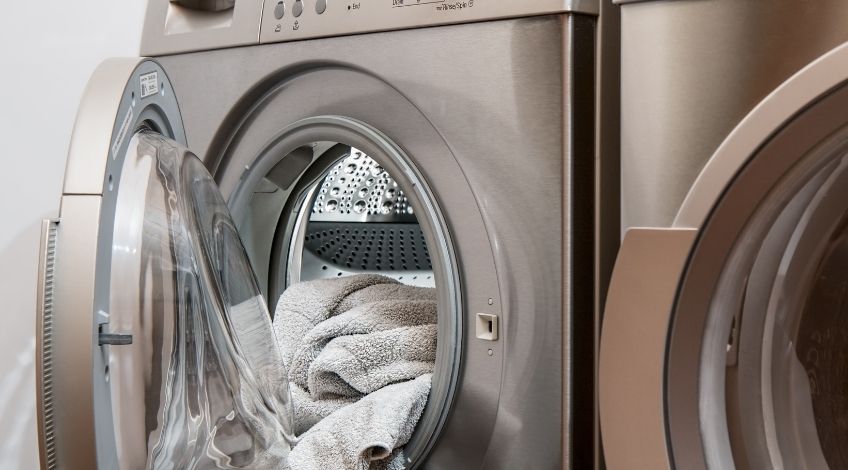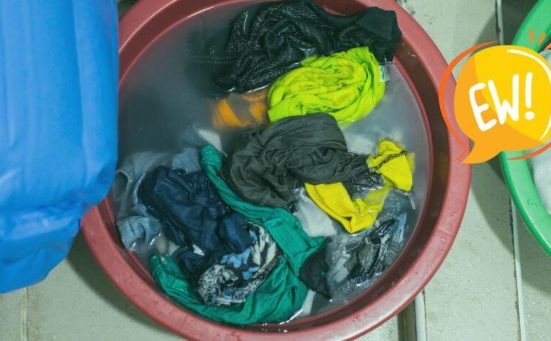
Why Does My Washing Machine Take So Long To Finish?
We all lead such busy lives nowadays and there never seems to be enough hours to fit everything in. One of the contributing factors to this is the amount of time the washing machine takes to finish.
In the interests of safety, we shouldn’t leave our washers unattended which means we are stuck in the home for the duration of the wash cycle. Which leads to the question, why does my washing machine take so long to finish?
In this article we look at why washers take so long to complete a cycle and look at possible ways to reduce this time.
Why Do Washing Machine Cycles Take So Long?
The reason why washing machines take longer to finish their cycles is because of the way they’re designed to be more energy efficient. 90% of all energy used during a typical wash cycle is used to heat the water. By using cooler temperatures, the washer can save a significant amount of energy.
However, to achieve a decent level of cleanliness, the laundry has to soak in the water for longer.
The length of time the clothes are in soak varies from cycle to cycle and manufacturer to manufacturer.
The European Union has regulated the energy consumption of washers and although we in the UK are no longer a part of the EU we still follow EU rules and regulations.
Washing machines sold in the UK have an energy rating which runs from A-G with A rated appliances being the most energy efficient. The cost of that higher energy efficiency is the extra amount of time the washer’s cycles take to complete.
Then there’s the sensors that are installed in modern washers. These sensors detect the weight of the wash load as well as the drum balance. If the drum is not balanced, the machine will take time to adjust the clothes in the drum.
This is achieved by spinning the drum one way and then the other until the sensors detect that the load is balanced. Then, and only then will the wash cycle commence.
Why Does It Take So Long To Open The Door At The End Of A Wash Cycle?

As if it wasn’t bad enough that some wash cycles can go on for 3, 4 or even 5 hours. We then have to wait for the long pause between the end of the cycle and the door lock being deactivated. Although this is typically only a 2 or 3 minute pause, it can seem like an eternity when we have so much else to get done.
The reason for the long delay between the cycle finishing and the door lock deactivating is safety. Washing Machine manufacturers put this delay in place to allow all of the water to successfully drain from the drum.
This prevents your home from becoming damaged by excess water and flooding.
How Long Should Wash Cycles Take?
Unfortunately, there is no set time for any particular wash cycle and each manufacturer sets their own. However, the average time for each wash cycle seems to be as follows;
| Wash Cycle | Typical Time Duration |
|---|---|
| Quick Wash | 15 minutes to 1 hour |
| Cotton Cycle | 1.5 hours to 4 hours |
| Synthetics Cycle | 1.5 hours to 3 hours |
| Delicates/Hand Wash Cycle | 45 minutes to 1.5 hours |
Let’s look at each of these cycles in more detail;
Quick Wash Cycle
The quick wash cycle is designed to wash a few items that are not too heavily soiled. It should not be used for delicate items or those that are too dirty.
The quick wash cycle can run for as little as 15 minutes or as long as 1 hour depending on the make and model of your appliance. This cycle typically has a fast spin speed which makes it unsuitable for delicate items.
Cotton Wash Cycle
This cycle is designed for washing cotton items like bedding, towels and cotton garments like shirts, t-shirts, etc. It can run for anywhere between 1.5 to 4 hours and uses high temperatures and considerably more agitation than other wash cycles.
This means the cotton wash cycle shouldn’t be used for washing other, more delicate fabrics.
Synthetic Wash Cycle
This is the cycle to use for washing fabrics other than cotton. Fabrics like; polyester, acrylics, mixed fabrics, etc. This is one of the most popular wash cycles as it is much gentler on clothes than the faster, rougher cotton wash cycle.
In most cases, the synthetic cycle is typically used for ½ loads. For instance, a 8 kg drum is often only loaded with around 4 kg of laundry. The duration of the synthetic wash cycle is typically 2.5 to 3 hours but there are variations in the duration depending on the make and model washer you own.
Delicate & Hand Wash Cycles
The delicate cycle is designed for washing delicate fabrics that are not synthetic. These include items made from lace and silk for example. The delicate cycle is typically a gentler wash with less agitation and lower water temperatures.
The hand wash cycle is designed for washing items that are hand wash only. It is even gentler than the delicate cycle and has even less agitation.
The average duration for the delicate and hand wash cycles is typically anywhere between 45 to 90 minutes.
Why Don’t They Always Take The Same Amount Of Time?
With everything we just said in mind, you may be wondering why it is that some days it takes 20 minutes to do a quick wash cycle, and other days it takes over 30 minutes.
The reason? There are certain factors that can affect the duration of any cycle, these factors include;
- An Overloaded Drum
Many modern washing machines have load sensors which detect the weight of the load and the level of soiling. If the drum is overloaded, the sensors may choose to run the wash cycle for longer in an attempt to get all of the laundry clean. - You’re Washing Heavier, Bulkier Items
Larger, heavier items tend to soak up more water which could entail extra rinsing if the sensors detect that the garments have absorbed too much water. - Selecting A Cycle With A Pre-Wash Option
Any cycle with a pre-wash option selected will take longer than the average duration. - Lower Temperature Wash Cycle
Cycles which have lower water temperature settings typically take longer than those using standard temperatures.
Why Are Eco Washes So Long?

The reason economy washes take so long is because they use water that hasn’t been heated to such a high temperature. It turns out that heating the water accounts for around 90% of the energy usage in a typical wash cycle.
The eco wash however, is different, it doesn’t use hot water but to allow the clothes to get clean, they need to soak for long periods to remove dirt and stains.
The amount of energy used during a 4 hour eco wash is far less than is used in a 20 minute hot wash. The eco wash relies on soaking and agitation to remove stains and not heat.
The eco wash typically uses less water as well which means the rinse cycle on an eco wash takes longer too. This is because the garments are soaked in clean water to remove the detergent and dirt.
When Is A Long Wash Cycle Too Long?
Modern washing machines generally take longer to complete wash cycles compared to older appliances. However, there is a limit, if a standard wash cycle is taking longer than around 3 or 4 hours, there could be something wrong with the appliance.
What Could Cause A Washer To Take Too Long?
A washing machine that continuously takes too long to run a wash cycle could have a problem. The main causes of this issue include;
- Defective Load Sensor System
- Faulty Water Inlet Valve
- Defective Control Board
If your washer is regularly taking 3 or 4 hours to complete a regular wash cycle, we recommend contacting the manufacturer if it’s still under warranty or a washing machine technician if the warranty has run out.
Are There Any Ways To Shorten The Wash Cycles?

Even though modern washers are designed to take longer to wash your laundry, there are a few steps you can take to shorten the duration. These include;
Never Overload Your Washing Machine’s Drum
If you overload the drum on your washer, it will have to work harder to get your laundry clean. In many cases this will mean the wash cycle takes longer than it should.
Select The Quick Wash Option
Obviously, this is not suitable for every wash load, but whenever possible, you can save time by opting for the quick wash cycle. Depending on the make and model washer you own, the quick wash can run from anywhere between 15 to 60 minutes.
Separate Bulkier Items From Lighter Garments
You should always wash similar items together, washing heavy items like towels and sweatshirts in one wash and lighter items like t-shirts in a separate wash.
Once items are fully wet, the sensors in the machine will recalibrate to allow for the extra weight of the water. This will mean lighter items will take less time overall than denser, bulkier items.
Ensure Your Water Pressure Is Correct
One reason for washing machines taking longer than average to complete a wash cycle is low water pressure. Check that the water pressure from the main water supply is adequate and check that the water inlet tap on your washer is fully opened.
Perform Regular Maintenance On Your Washer
A clean machine is a more efficient machine. You should regularly clean the filter on your washer to remove any blockages etc. Running a hot 90°C service wash once a month will ensure that your washer is working properly.
This will counteract any problems caused by running too many quick wash cycles which don’t always fully dissolve detergents and fabric softeners. The service wash will remove any detergent/fabric softener build up as well as any accumulated limescale or dirt build up.
Buy A Washer With A Larger Drum Capacity
OK, this won’t decrease wash cycle run times, but it will allow you to use the machine less frequently. This will reduce the amount of days per month that you need to wait for hours on end for your washer to finish.
SEE ALSO: Is A 15 Minute Wash Cycle Enough To Clean Clothes? (when & how to use it)
Frequently Asked Questions
If your washing machine takes far longer than normal to finish a wash cycle, it could be caused by the load in the drum not being level or the load sensor system has developed a fault, the water inlet valve is defective or the control board is faulty.
One of the main causes of a washing machine still running after 4 hours is an unbalanced load. If the items in the drum aren’t evenly distributed, the load sensor system will attempt to sort it out. This will extend the duration of the wash. Or, it could be a faulty water inlet valve or a defective control board.
Whether it’s normal for a washer to take 2 hours depends on the wash cycle selected. There are some wash cycles like the cotton or synthetic cycles that can take as long as 3 hours or more.
Also, follow us on Pinterest ...



